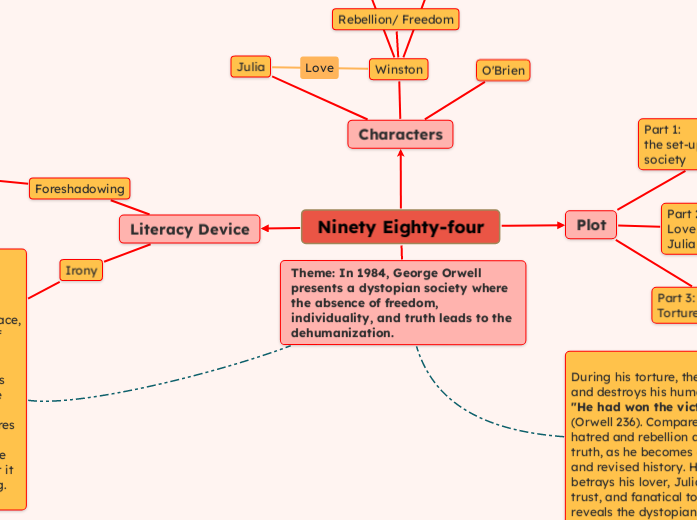Ninety Eighty-four
Literacy Device
Irony
The author introduces the four ministries of government, "The Ministry of Truth, which concerned itself with news, entertainment, education, and the fine arts; the Ministry of Peace, which concerned itself with war; the Ministry of Love, which maintained law and order; and the Ministry of Plenty, which was responsible for economic affairs."(Orwell 7). The four ministries that do the opposite actions of their names are ironic. The Ministry of truth rewrites historical records. The Ministry of Love arrests and tortures their citizens. The Ministry of Plenty leads to poverty. This reveals a feature of dystopian: the Party creates a false peace and prosperity, but it is actually internal contradictions and suffering.
Foreshadowing
The author uses several foreshadowing to hint the audience's tragic fate of Winston and Julia.
Plot
Part 2
Love story of Winston and Julia
Part 3:
Torture and brainwash
During his torture, the Party forces Winston to accept its ideology and destroys his humanity. Winston ultimately brainwashes himself: "He had won the victory over himself. He loved Big Brother." (Orwell 236). Compared to his former self, Winston abandons his hatred and rebellion against the Party. He no longer pursues the truth, as he becomes completely trusting of the Party's fabrications and revised history. His desire for love and freedom ends when he betrays his lover, Julia. The new Winston is absolute loyalty, blind trust, and fanatical to the Party and its leader, Big Brother. This reveals the dystopian society destroys the citizens' humanity and individuality, which against the human nature.
Part 1:
the set-up of the Oceania society
Characters
Winston
Curiosity
Naive
Rebellion/ Freedom
O'Brien
Julia
